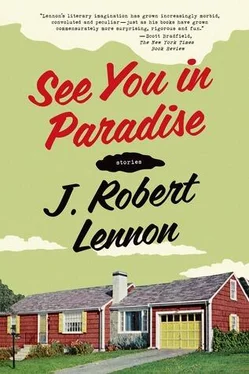The first time she did this, he was simply shocked, and said and did nothing. He pretended, in fact, to sleep. But on the second, he hazarded a glance in her eyes, which were wide open and staring, and the two of them gazed at one another with great intensity for the three minutes the experience lasted. The next night they kissed, and the night after that she tried to get him going, too. She undressed him, touched him, kissed him, and though his blood quickened, his palms perspired the way they had before the accident, he could feel nothing where it mattered, and he wept.
Somehow, though, it must have gratified her, because she persisted night after night, and slowly his humiliation drained away — part of it, anyhow — and he was able, at last, to enjoy this new intimacy, however limited, however unsatisfying it had to be. During this ritual, they never spoke, and they said nothing about it during the day, either, and it was like a secret between them, a secret not from the world outside, which they had never been open to anyway, but from each other, and from themselves. It was strange and, at least to Philip, not quite right. But life was much better with it than without.
A couple of weeks after the hibachi arrived, Evangeline informed him that they were going to have a dinner party.
“Why?” he couldn’t help asking.
“I’ve taken the liberty of inviting Bob, Candace, Roy, and June. They’re coming here on Friday night.”
For a moment, Philip thought, Who? Then he remembered their old acquaintances, and the question again turned to Why? The answer, for the moment anyway, did not reveal itself in Evangeline’s face. Her eyes blinked behind her thick smeary eyeglasses. Her smile could be described as beatific. She looked and sounded nothing like the woman he had come to know from their marriage bed. “There is nothing you need to do,” she went on, continuing to ignore his question, “other than enjoy the show.”
“The show?”
She patted his hand and went back to her book.
On Friday, their guests arrived at the promised hour, simultaneously but in separate cars. Bob was a round man with a round face who nevertheless was considered handsome, and by and large was. He had thick hair without any gray and large, deep, newscaster eyes, which always focused just over Philip’s head. His voice was deep and his manner authoritative. His wife was taller than he was, but in contrast to Evangeline seemed frail and tentative, despite being the youngest among them. When confronted with any awkwardness, Candace had a tendency to turn her head to one side, squint, and quietly tsk. Roy and June, on the other hand, were quite similar in appearance and manner, stocky and loud. They liked to tell jokes, which they got off the internet. They slapped each other’s knees when amused, usually by the jokes they told. To their credit, they were the ones who had persisted the longest in visiting Philip during his recuperation, though in his presence they mostly talked with each other.
Now these four were arrayed around the living room, holding glasses of wine and looking uncomfortable. “Please sit anywhere,” Philip had told them, and Roy had replied, “Except for your chair, right!” and roared with laughter. He and June were chuckling randomly and reassuring one another with pats on the leg, and Bob kept holding up his wineglass to the light. Every now and then Candace coughed, her mouth a thin flat line. Philip recalled all his previous evenings with these people, the hours of mild boredom and unintentional ostracization, and he wondered if he ever would have seen them again even if he’d never been injured. Probably not. It occurred to him, perhaps for the first time, that he didn’t actually like having friends. He liked to be alone. This is why he liked being an accountant — there was no greater pleasure than being alone with the numbers, putting them in order, making them add up. Actually, no — the only pleasure as great was Evangeline. She made him feel the same way: as though all was right with the world, as though everything added up. He wondered how she had persuaded their guests to come, after all this time. He wished she were here now, in this room with them.
Where on earth was she?
The kitchen door banged open. There she was: bent half over, in a ploughman’s stance, wheeling the hibachi before her. It was very large, too large to move really, and it gouged the wall and pushed an ottoman into an end table, setting the vased flowers upon it into a treacherous wobble.
“Would you like help with that, my dear?” Bob asked her, rising to his full height, and Evangeline ignored him, and eventually he sat down again. The hibachi stood before them now, its exhaust tent forming a proscenium inside which she stood, white-apron’d and white-hatted, her gaze settling briefly upon each guest. She nodded, and everyone but Candace nodded back.
From somewhere underneath the grill Evangeline produced five bamboo trays, five plates, and five sets of utensils wrapped in a napkin. The trays were affixed with wooden bracing that swung down to make a little table. Philip had no idea where they had come from. She distributed the trays, placed a plate upon each tray, a rolled napkin beside each plate.
When she set Philip’s place, she winked.
“Well, look at this!” June cried.
“Perhaps,” Bob muttered, sounding uncertain, “we would be more comfortable at table?”
“What’s this ‘at table’?” Roy said. “What language are you speaking, Bobert?” He guffawed. June guffawed.
“It’s a common expression,” Bob replied.
“A common expression is ‘put your money where your mouth is,’ or ‘you get what you pay for,’ not ‘at table’! ‘At table’!” Roy laughed, and June laughed, and soon they were both caught up in hysterics. Bob was leaning slightly forward, his brow furrowed, and Candace continued to cough. Philip again wondered why Evangeline had invited them over. He hoped it wasn’t for his sake.
By now she had fired up the propane tank and was smearing oil over the surface of the grill. Roy and June were still giggling, but Bob had grown curious and leaned forward for a better view. Philip recalled, with a small shudder, the onlookers who had observed him lying there, broken on the pavement — long after 911 had been dialed, long after the reassuring words had been spoken, people just stood over him, staring at his ruined legs, twisted underneath him, had watched his face contort in pain. On the edge of unconsciousness, he had lain there, thinking, For chrissake, you idiots! What in the hell are you standing there for? It wasn’t that he hated them for it, or that he even minded. What did it matter to him? All he wanted at the time was not to die. But he didn’t understand them. He didn’t understand people at all.
Except Evangeline — he understood her, a little. He was so grateful to have her. He was so very much in love with her.
For a minute there, he hadn’t been paying attention. But what she had done was to spin the egg on the cooking surface, just like the guy at the restaurant, and then toss it into the air, and catch it in the hollow of her hat. And, like the guy at the restaurant, she let it fall from there, and allowed her spatula to split it in two, and she caught the eggshell with one hand and scrambled the egg with the other, the very same way he had. And she grabbed from her caddy a canister of salt, and a canister of pepper, and tossed them from hand to hand, so that they tumbled in the air, spilling just the right amount of their cargo onto the egg, and Philip did not remember the restaurant chef even attempting to do that. And she brought out a bowl of steamed rice and fried it, and sprinkled on sesame seeds, and squirted on soy sauce and teriyaki, all with a balletic, nearly acrobatic, precision, and he realized that his wife had discovered something in herself she never knew was there — she had mastered her body.
Читать дальше












